A Pixel Story (PC) Review
By Jordan Hurst  17.07.2015
17.07.2015
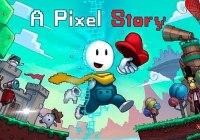
The stated goal of A Pixel Story is one that a lot of aspiring designers have probably thought about: using gameplay and aesthetics to track the evolution of videogames. In fact, at least one title, Evoland, already did it, with predictably poor results. "Predictably" because, while a playable videogame history lesson sounds really cool, it's a completely impractical idea. It's difficult enough to create a good product using only one set of mechanics and one art style; trying to represent years of progress in one game will inevitably lead to a watered-down product, a hurricane of shallow references, or both. A Pixel Story's problems go much deeper than its ill-fated concept, however.
For one thing, despite it being in the very first sentence of the game's Steam description, the "evolution of video games" concept is actually rather downplayed. Yes, progression is marked by increased graphical quality, and Pong makes a recurring appearance, but most of the references are broad and subtle, and any new mechanics introduced have nothing to do with the graphical eras they are received in. The eras also don't align to any specific games or consoles' graphical styles, so it's strange that the developer bothered with the gimmick at all. The upside to this is that it manages to have an identity of its own, despite expectations. The downside is that that identity is completely unremarkable.
The hero of A Pixel Story is a nameless, personality-devoid silent protagonist constructed from a mutated Pong ball and literally dressed in whatever clothes happened to be on hand at the time of his creation, including an unlabelled Mario hat. If there was a prize for the protagonist that most represents their game's content, he would win it. He's created to be a kind of living reset button for the System (the computer programme that is this title's setting), tasked with reaching and deleting the new Operator, who is apparently evil in some non-specific way. He is assisted by Search, a talkative robot guide, and the aforementioned Mario hat, which is actually a special artefact of the System that allows its owner to teleport to its location.
This is likely titled as it is for two reasons: to emphasise the importance of its narrative, and to put it in line with its most obvious influence, Cave Story. Both are unassuming 2D platformers that attempt to surprise the player by being more than they look. However, while Cave Story surprised with its interesting characters and uncompromising twists, A Pixel Story merely sucks gamers in with some early well-delivered intrigue before proceeding with a plot as uninspired as an average SNES platformer. It turns out that "emphasis on story," in this case, just means "one-off characters will talk too much while offering mandatory fetch quests." At least the writing is solid, apart from its bloat, and it can be quite funny at times, too.
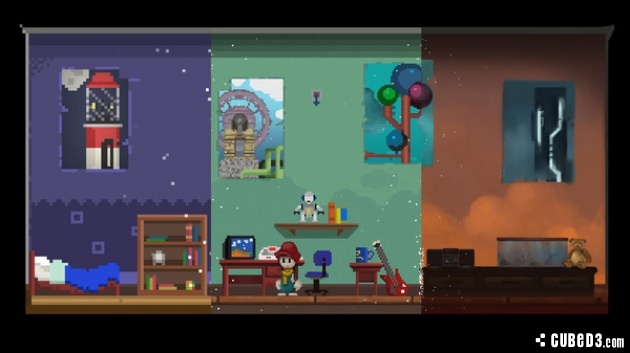
Good writing can't distract from the unforgivably neglected premise, though. The fact that it all takes place inside a computer is totally irrelevant once things get moving. Aside from the levels being divided into "Generations" of varying pixellation, every entity could be replaced with literally anything else, and the plot wouldn't be affected at all. Bizarrely, a lot of the material that could have made the story more interesting seems to be happening in the background. Each of the 64 plot coupons has a surprisingly dark bit of lore attached to it that has no significance in-game. It can be completed with only 15 of them, so it's possible collecting them all reveals a true ending, but any game that locks vital story details behind 15 hours of endgame content needs to get its priorities straight.
Of course, collecting those remaining 49 items would be a lot more appealing if the gameplay was at all entertaining. The first problem is that it's slow, and not just because of the protagonist's impotent movement capabilities. The tutorial is unnecessarily long, and even the so-called fast travel system requires two loading screens and a lot of player involvement. Normally, a puzzle-platformer is allowed to have a more relaxed pace, but A Pixel Story isn't structured like a normal puzzle-platformer. It actually feels like a really shallow Metroidvania; the main path is basically a straight line from left to right, but every room has at least one branch leading to an optional puzzle. Large worlds and slow movement speed are an awful combination, especially when the obstacles are puzzles that must be re-solved to traverse a second time.
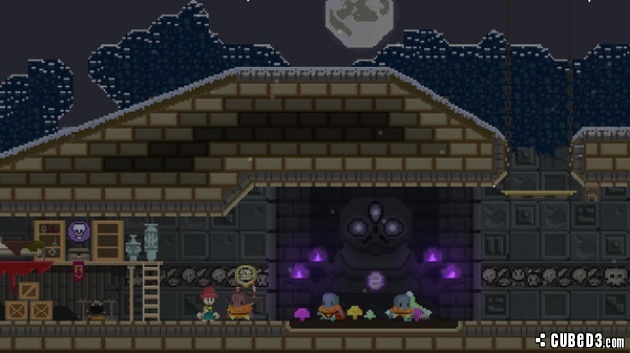
The second, more detrimental problem is the obnoxious difficulty level, almost always related to unfortunate design choices. The gameplay usually focuses on the teleportation hat, for example, letting moving platforms carry it past harmful terrain before safely teleporting to it, or using its momentum-conservation property to access higher ground. The mechanics themselves are perfectly functional; it's the composition that's problematic. The puzzles are usually multi-step affairs that involve avoiding lethal obstacles - a hazardous pairing that forces defeated players to trek back from the most recent checkpoint and redo the early stages of each trial. Most of them also require more than just a logical solution, incorporating physical tasks that demand ROM hack levels of perfection. This is especially troublesome because it's often hard to tell if a given obstacle is actually a puzzle or an especially taxing platforming segment.
The controls are a huge component of this frustration. Once again, they are perfectly simple and responsive, but they are victims of physics code that's completely inappropriate for the type of challenge presented. Despite the developer's obvious affection for Mario, it apparently forgot that intuitive midair control was one of the landmark features of Super Mario Bros. In A Pixel Story, there is a fixed jump height and only slight control over the mid-air trajectory is possible, making the precision platforming the game keeps demanding completely unrealistic. It also contains 15 optional challenge rooms that are explicitly stated to be frustrating. Collecting hundreds of coins throughout the System to unlock these challenges is a boring enough task, but the thought of doing so for the "privilege" of tackling the most unfair trials is laughable.
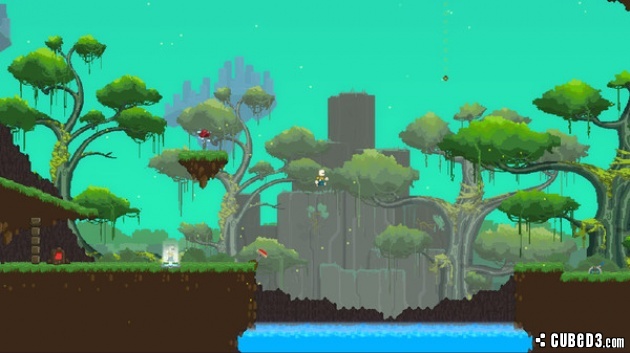
It's all such a shame, because the more straightforward puzzles are quite well-designed. The teleportation hat proves to be surprisingly versatile thanks to a variety of environmental mechanics that augment its use, such as elastic surfaces that allow for all manner of unorthodox aerial manoeuvres. One of the later areas introduces the ability to summon a mechanical clone for multitasking purposes - a fairly standard puzzle element these days, but the ability to swap the hat between protagonist and clone reinvigorates it. Finally, part of the reason the empty story is such a slap in the face is that the opening hour of it is told so expertly. There are plenty of mysterious events and foreshadowing to get the player interested, but none of it has any payoff.
The presentation is also stronger than expected. Not adhering to the limitations of real consoles allows the game to look great regardless of what Generation is currently being explored, although the hand-drawn third Generation is a highlight, nevertheless. There's a slight lack of visual clarity regarding what certain objects are in the early Generations (that probably would have been ironed out if things were more focused), but otherwise, the graphics are quite agreeable. Additionally, the audio has a fair amount of retro charm to it. In fact, the soundtrack is likely the best part. The only problem with both the music and the sound effects is their eventual repetitiveness.
Conversely, the worst part is the final Generation. A Pixel Story seems to have a quiet disdain for modern videogames from the outset; the later Generations are said to be created by the villain, and all of the references are to '80s and '90s classics or 2D indie games, but the last area is where it's most obvious. The best visuals are wasted on a gloomy city environment, and gamers are given a potentially awesome Iron Man-esque suit that's used exclusively for not-particularly-quick time events. It would be a scathing indictment of AAA games…except it never acknowledges what a terrible conclusion it is. In (presumably) trying to parody vapid modern games, A Pixel Story merely becomes one.
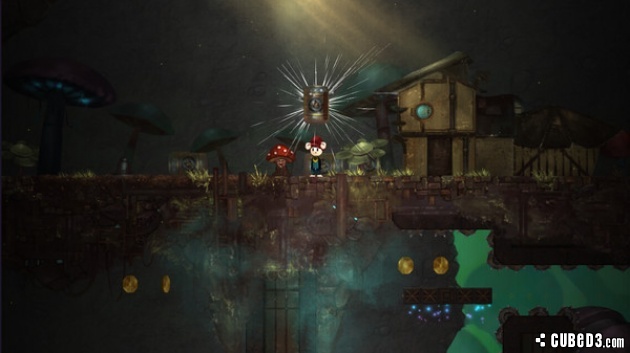
Cubed3 Rating
Bad
A Pixel Story would almost definitely have been better if it had abandoned its attempt at interactive nostalgia. Not only would the story feel like less of a wasted opportunity, but some of the faults in the gameplay might have been caught and resolved if the developer wasn't obligated to manufacture multiple art and audio styles. The degree to which it would be improved is debatable, however, because many of those flaws are endemic to the game's design. Having openly admitted to making the optional areas frustratingly difficult, it's not unreasonable to assume that the team wanted it to be this hard. Furthermore, while the mechanics are flexible, they are not nearly flexible enough to justify the setting's excessive size. Currently, the game is a functional, attractive chore without the sense of accomplishment that doing actual chores would provide.

![]() 3/10
3/10
![]() 0
(0 Votes)
0
(0 Votes)
 Out now
Out now  Out now
Out now  None
None  Out now
Out now Comments
Comments are currently disabled

 Sign In
Sign In Game Details
Game Details Subscribe to this topic
Subscribe to this topic Features
Features





 Top
Top

